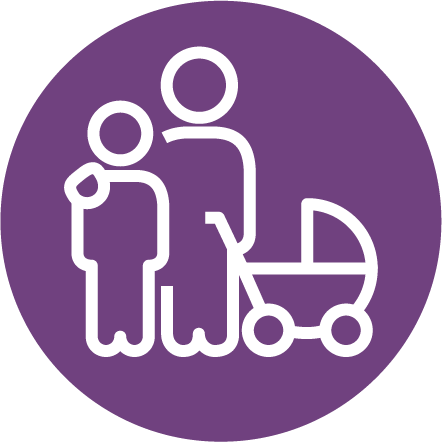- Basic computer skills and training for parents
- GED programs for parents
- Learning English as a Second Language for adults
- Literacy programs available to parents


How can the MEP share information about services with families?
The MEPMigrant Education Program may coordinate with other departments within their district to host a community service fair, inviting local clubs, agencies, businesses, and colleges/universities. This centralized event would provide parents information about services offered by each program. MEPMigrant Education Program staff may promote parent participation in local community fairs coordinated by other entities, such as the Chamber of Commerce, health agencies, medical/dental/vision practices, churches, or institutions of higher education.
-
Many districts in our state conduct events specifically for their parents of migratory students to provide service coordination
information. Two examples of this type of event are:

- Host a service coordination event. Invite district departments, community organizations, local businesses, and higher education institutions to share information with your migratory families early in the school year.
- Donna ISD offers a social services fair to introduce migratory parents and students to different agencies and services in the community.

- MEPMigrant Education Program staff may also assist migratory students and parents by collaborating with other departments, programs, and services within their own school district. This can be done by having the MEPMigrant Education Program district director and/or staff collaborate with appropriate administrative staff to assess and coordinate services for each migratory student. By having these coordinated discussions on the academic, social, and/or emotional needs of students and how they can successfully progress in each area, they are ensuring that the student feels that he/she has a support group at school as well as at home. After the student is assessed, it is important for the MEPMigrant Education Program staff to meet with the student and parents to share the information gathered. Pharr-San Juan-Alamo (PSJA) ISD conducts a similar collaboration meeting between MEPMigrant Education Program staff campus principals, counselors and district program coordinators every year to help migratory families.
- Another way MEPMigrant Education Program staff can help to facilitate the process of making referrals to other departments, programs, and services within the district on behalf of a migratory student at any level is by providing a letter which explains how a parent can collaborate with school staff to access resources their child may need within the school system. A Sample Letter for Middle School found in the Texas Manual for the Identification and Recruitment of Migrant Children is a great example of this kind of resource. This letter also includes a form with contact information easily accessible to parents in English and Spanish. (Click on the English Version or Spanish Version). 15
- ESC MEPMigrant Education Program staff and/or local district staff may offer informative parent meetings and parental engagement workshops throughout the year on a variety of topics to help parents learn about services and programs in their communities and how to access those services. These meetings may be offered at the ESC facility, on a school campus, or in a local multipurpose community center. It is highly suggested that the presentations at these meetings be provided in the native language of the majority of the parents or in a bilingual setting. It is also important to note that by providing childcare and a light snack, parents are more easily able to attend the event and participate fully. The following list includes some suggested topics for these informative meetings by categories:
 Adult and
Family Literacy
Adult and
Family Literacy
 Clothing/Food
Clothing/Food
- Clothing closet and other programs that help with clothing/coats
- Food pantries in the community
 Financial Aid
Financial Aid
- The application process for admission into college
- Going to college if I have/don’t have legal immigration status
-
How to apply for
financial aid
(FAFSA, TAFSA, scholarships) - How to apply for scholarships
- How can your child go to college?
 Health/
Counseling
Health/
Counseling
- Common contagious diseases in school
- How can I help my child improve behavior?
- Immunization requirements for school age children
- What are some precautions to take to avoid contagious diseases?
 Housing
Housing
- Available programs to assist families with housing
- Church programs that assist families with utility bills
 Legal Assistance
Legal Assistance
- How to apply for a passport
- How can I get a Green Card?
- What are the immigration laws and pathways?
- Where can I find a religious/charitable organization to help with immigration paperwork and fees?
- Who can apply for permanent residency?
 Nutrition
Nutrition
- Accessing free and reduced meals at school
- What’s on the school menu?
- What are healthy eating habits?
- The benefits of healthy foods in your child’s diet
- Who qualifies, what benefits are received, and how to apply for WIC Women, Infant, and Children programs?
Show references >
15 Texas Education Agency, 2019-2020 and 2020-2021 Texas Manual for the identification and Recruitment of Migrant Children (Texas Education Agency, 2019), pp. 5.35-5.40.
.png)